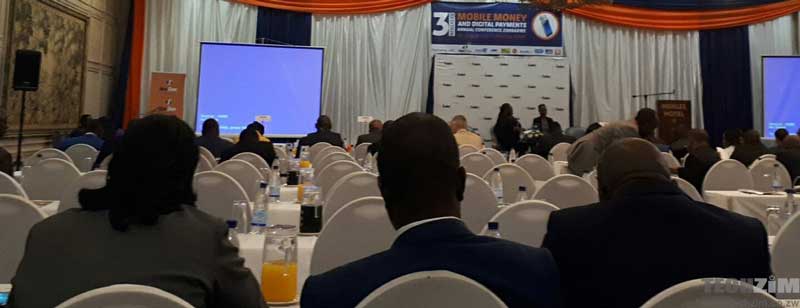The mobile money and digital payments conference has started today at Meikles Hotel. The conference is facilitating discussions on some of the issues in the mobile commerce ecosystem. The first presenter was Mr. D. Chinoda and he was talking about the state of the banking and mobile money sectors. The main topic around his talk was “Regulating Bank Charges and Mobile money Tariffs – balancing regulations and innovation”.
He first talked about some of the main sources of cash problems like people importing a lot of goods from abroad and underfunded Nostro accounts. This was so that we’d understand why it is a big deal that many people don’t have access to financial services. According to an RBZ report, approximately 9 million people are on mobile platforms and only a third of them are active.
These 9 million, they are over 14 years of age. This might sound good but compared to the population of the country, that number is small. Around 70% of the population still doesn’t have access to financial services. Why is it like that. The reality is that these services have large barriers to entry that some of us may not actually see.
To get a bank account, you need to have proof of residence, a national ID and sometimes a deposit fee. It sounds crazy to think that 70% of the population don’t have these requirements. However, it is true. Rose Siyachitema, panelist from CCZ, commented saying that “the services are non-inclusive and companies advertise showing someone in the rural area getting funds via these facilities but that’s where it ends. We are not really helping these people if all we do is use them in adverts but don’t actually lower the requirements for people to access financial services.”
Aside from the entry requirements, the bank charges and mobile money tariffs are so steep that the majority are scared away as they know they won’t be able to meet those charges. Why is it a big deal that the tariffs and requirements get lowered? Ethel Bangwayo, panelist from UNDP, added on top of what Rose had echoed earlier saying that “65% of the population are in remote areas and a country cannot succeed economically if we don’t include these people”.
People need to transact electronically with the cash crisis that the country is facing but they can’t. Some of the things like getting a national ID may not be entirely be caused by the financial industry. However, we live in a collaborative world where companies that offer these financial services could work with the powers that be on these basic issues. Tell us what you think, do you agree that these are real issues being faced by people?

One response
About a year ago I tried to open a second bank account. I am fortunate in that I have one already, albeit that I am most dissatisfied with their services and charges.. I telephoned several banks to be told that they were ‘no longer opening new accounts’. One bank that is opening new accounts is Steward Bank but they seem to be so overwhelmed with new account holders that they cannot process electronic payments timeously. So where do people go when they don’t have an account? Probably RoadPort.